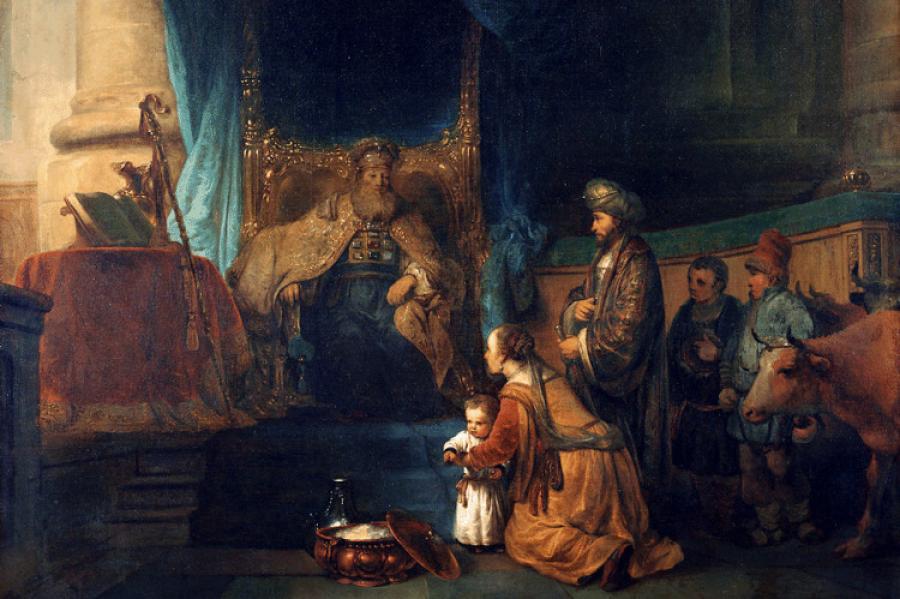Heaven Was Listening
Image

Hannah presenting her son Samuel to the priest Eli, Gerbrand van den Eeckhout, ca. 1665
The nation was desperate for leadership.
His improbable but swift ascent to fill the vacuum was as dramatic as it was unlikely. Humanly speaking, it was propelled solely at the behest of a praying mother.
Outside of her influence, the rest of his family’s situation was, to say the least, dysfunctional. In fact, the lessons that he learned there, as well as what he saw in his only other spiritual mentor, may have factored into the shortcomings that were evident in his own family later in life—the only ailments that hampered a career which otherwise succeeded all reasonable expectations.
At a young age, he gained fame as an itinerant teacher and authoritative speaker. Soon he rose to national prominence, and became a counselor to kings.
Though hard to believe, it really seems that it was the faith and prayer of his godly mother that gave him the spiritual impetus to carry out a lifetime of service—even though she had him at home for only, perhaps, three years before he was taken off to begin an accelerated maturity process. Away from home, raised by strangers, but called by God, adulthood came early for this young man, and exceptional was a word that many could easily have used to describe him at a similarly youthful age.
When we realize that the circumstances that this man faced also included political intrigue, national crises, warfare, apostasy and immorality, we might wonder if we are hearing a 21st-century tale. Our story, however, actually took place more than 1,000 years before Christ. It is the account of the life of Samuel. God provided this man to the nation of Israel in answer to the prayers of his faithful mother Hannah, whose pious life stood out brightly against the dark backdrop of her day—an era which can immediately be characterized simply by thinking of it in relation to the period of the Judges:
In those days there was no king in Israel; everyone did what was right in his own eyes. (Judg. 21:25)1
From such an inauspicious beginning, Hannah’s son rose to an unprecedented place of honor in Israel—his mark forever certified by his inclusion on God’s honor roll (Heb. 11:32). He was, in fact, the last judge and first prophet sent by the Lord God to His people (see 1 Sam. 3:20; 7:15-17; 9:9; Acts 3:24; 13:20). As an early writing prophet, he has long been recognized as an author of inspired Scripture (1 Sam. 10:25; 1 Chron. 29:29). He was a Levite who functioned as a priest (1 Sam. 2:18; 3:3; 10:8; 1 Chron. 6:31-34). He also anointed both Saul and David into the kingship (1 Sam. 10:1; 16:13). Truly, many of the vital issues of Old Testament history and theology intersected with his life.
I find that the attention given to Samuel is woefully inadequate in comparison to the importance that the Scriptures place upon him (note Jer. 15:1). I first presented a study of Samuel’s life more than 20 years ago, and have been fascinated with his example ever since. Sometimes he is presented merely as a foil to King David. In reality—in terms of human experience—it was Samuel who made David, not vice versa (note 1 Sam. 19:18; 1 Chron. 9:22). When Samuel died, it appears that—spiritually, at least—David’s best days were behind him (see 1 Sam. 25:1, and David’s apparent response in Ps. 12:1).
Samuel was by no means perfect, and even seems to have reproduced the errors of his mentor, Eli (see 1 Sam. 8:1-5; Ps. 99:6-8). Looking over the totality of his life, however, I can’t help but sense that—just as we have largely disregarded his significance in the Scriptures—we have often failed to implement the standards he displayed for us. All leaders should take them to heart, especially those who serve in Christ’s church.
Samuel’s name ends with the name of God, and its beginning relates to some form of the words name or hear. Given the prominence of prayer in the lives of both Samuel (see 1 Sam. 7:5; 12:23) and his mother Hannah (see 1 Sam. 1:10-13, 20; 2:1-10), it seems likely to me that his name meant “God hears”—hence, my title for his life story is “The Man Heaven Heard.”
Perhaps the greatest thing that Samuel ever did was simply to arrive in Israel with a tender spirit and a willing heart, eager to serve God in spite of hardships, counting his privileges but never his sacrifices.
Upon the passing of former President Gerald Ford in December of 2006, President George W. Bush commented succinctly: “Gerald Ford came along when we needed him the most.”2 Likewise, truer words could not be spoken about the prophet Samuel who appeared, in the providence of God, to shepherd a needy people, at the perfect time.
If we would take it to heart, his life could have a profound impact upon us at this strategically vital moment in history—even an impact that is worthy of his marvelous example.
Certainly, above all, he was a man of prayer—and heaven was listening.
Notes
1 Scripture taken from the New King James Version®. Copyright © 1982 by Thomas Nelson. Used by permission. All rights reserved.
2 Bill Nichols and Tom Vanden Brook; “Tributes pour in for Ford;” USA Today; 27 December 2006; https://usatoday30.usatoday.com/news/washington/2006-12-26-ford-obit_x.htm, Internet; accessed 1 September 2022.
Paul Scharf 2019 Bio
Paul J. Scharf (M.A., M.Div., Faith Baptist Theological Seminary) is a church ministries representative for The Friends of Israel Gospel Ministry, serving in the midwest. He also assists Whitcomb Ministries and writes for “Answers” Magazine and Regular Baptist Press. For more information on his ministry, visit foi.org/scharf or email [email protected].
- 58 views


Discussion